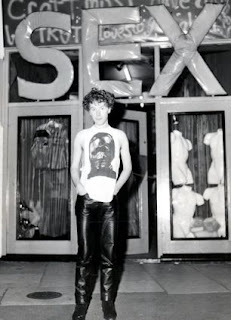“Stealing things is a glorious occupation, particularly in the art world.”
Malcolm McLaren
Malcolm McLaren, who has died from cancer at age 64, came to public attention in 1976 as the manager of the Sex Pistols, the punk band which he steered to fame and notoriety before their implosion barely two years later. McLaren is considered the godfather of punk and first made his name in 1971 when he opened a fashion boutique on the Kings Road in Chelsea with his partner, the designer Vivienne Westwood. With his unerring eye for publicity, he renamed the shop Sex. In 1975, he spotted a young punk called John Lydon who regularly hung around outside the shop. McLaren signed him up as the frontman of the fledging punk band he managed and the Sex Pistols were born.
When the band released God Save The Queen during the Queen’s Silver Jubilee in 1977, they became one of the most notorious acts in British music history. He once said: “I am a product of the Sixties. All I have ever felt is disruptive — I don’t know any other way.” McLaren always said punk was an attitude. "It was never about having a Mohican haircut or wearing a ripped T-shirt. It was all about destruction, and the creative potential within that. It turns out that the bankers may have been the biggest punks of all; they were making punk investments. I've always embraced failure as a noble pursuit. It allows you to be anti whatever anyone wants you to be, and to break all the rules. It was one of my tutors at Saint Martins, when I was an art student, that really brought it home to me." He said that only by being willing to fail can you become fearless. He compared the role of an artist to that of being an alchemist or magician. And he thought the real magic was found in flamboyant, provocative failure rather than benign success. "There are two rules I've always tried to live by: turn left, if you're supposed to turn right; go through any door that you're not supposed to enter. It's the only way to fight your way through to any kind of authentic feeling in a world beset by fakery. I believe in ideas, not products. Any survivor of a Sixties art school will tell you that the idea of making a product was anathema. That meant commodification."
ARE YOU FEELING LUCKY PUNK?
